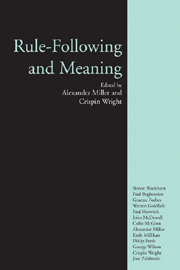Book contents
- Frontmatter
- Contents
- Acknowledgements
- The Contributors
- 1 Introduction
- 2 Skepticism and Semantic Knowledge
- 3 The Individual Strikes Back
- 4 Wittgenstein on Following a Rule
- 5 Wittgenstein, Kripke and Non-Reductionism about Meaning
- 6 Kripke on Wittgenstein on Rules
- 7 Critical Notice of Colin McGinn's Wittgenstein on Meaning
- 8 Meaning and Intention as Judgement Dependent
- 9 The Rule-Following Considerations
- 10 The Reality of Rule-Following
- 11 Truth Rules, Hoverflies, and the Kripke–Wittgenstein Paradox
- 12 Kripke on Wittgenstein on Normativity
- 13 Meaning, Use and Truth
- 14 Kripke's Normativity Argument
- Guide to Further Reading
- Index
3 - The Individual Strikes Back
- Frontmatter
- Contents
- Acknowledgements
- The Contributors
- 1 Introduction
- 2 Skepticism and Semantic Knowledge
- 3 The Individual Strikes Back
- 4 Wittgenstein on Following a Rule
- 5 Wittgenstein, Kripke and Non-Reductionism about Meaning
- 6 Kripke on Wittgenstein on Rules
- 7 Critical Notice of Colin McGinn's Wittgenstein on Meaning
- 8 Meaning and Intention as Judgement Dependent
- 9 The Rule-Following Considerations
- 10 The Reality of Rule-Following
- 11 Truth Rules, Hoverflies, and the Kripke–Wittgenstein Paradox
- 12 Kripke on Wittgenstein on Normativity
- 13 Meaning, Use and Truth
- 14 Kripke's Normativity Argument
- Guide to Further Reading
- Index
Summary
In this paper I address some of the points Saul Kripke makes in his treatment of the ‘rule-following considerations’ in the later Wittgenstein. There are two different quarries to track down. There is the question of whether Kripke's exegesis of Wittgenstein is correct – whether KW is LW. And there is the distinct question of the real significance of the considerations, as they are put forward by KW. Kripke himself is carefully agnostic about this second issue. KW is not Kripke in propria persona. And Kripke is also careful to distinguish the exegetical issue from the question of significance. The two issues only connect like this. If KW's arguments have some property which we are convinced cannot belong to any argument which LW would have used, we shall suppose that KW is not the real LW. And admirers of Wittgenstein will suppose that significance is such a property: if KW's considerations are faulty, then for that reason alone KW cannot be LW. LW would not have used faulty considerations. But without commenting on this optimism, I want to discuss two other properties which might distinguish KW from LW: KW's use of skepticism, and his attitude to facts. Each of these aspects may legitimately raise worries about his identity with LW. And I shall also offer some thoughts about the significance of KW's arguments for our conceptions of meaning.
Our topic is the fact that terms of a language are governed by rules that determine what constitutes correct and incorrect application of them. I intend no particular theoretical implications by talking of rules here. The topic is that there is such a thing as the correct and incorrect application of a term, and to say that there is such a thing is no more than to say that there is truth and falsity. I shall talk indifferently of there being correctness and incorrectness, of words being rule-governed, and of their obeying principles of application. Whatever this is, it is the fact that distinguishes the production of terms from mere noise, and turns utterance into assertion – into the making of judgement.
- Type
- Chapter
- Information
- Rule-Following and Meaning , pp. 28 - 44Publisher: Acumen PublishingPrint publication year: 2002
- 3
- Cited by



